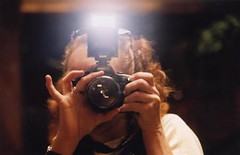Not long after September 11th, a woman from New York had a meeting with my boss at MGH. We chatted before her meeting started and she told me about a New York Times article that she had read and I asked if she would fax it to me. I dug through my files today and found the article.
By ANNA FELS, M.D.
Part of
Standing physically close to strangers in silence feels bizarre, but then again, so does any kind of gratuitous pleasantry. There is no right way to do it.
Yet as so often occurs in
In the elevator of my apartment building I have, quite literally, a nodding acquaintance with any number of people. One of these was an attractive professional woman whom I would often see on the elevator in the morning. She had a pleasant, open face and a chic but slightly old-world style of dress. Sometimes she would even wear fashionable hats, a touch that I found nervy and original. We would smile at each other as we headed out into the sunny or wet or autumnal days.
Two weeks ago, a few blocks from our building, she hailed me and fell into step as I walked. Clarin, as my neighbor is called, had seen a piece of mine in this column about one of my psychiatric patients who had died of cancer.
She had been particularly moved by the article because she had recently experienced the death from cancer of her male companion. Walking down the street, we chatted about the uses of psychiatry in such situations. We parted feeling much more like neighbors than we ever had before.
Two days later, when I finally arrived home on that terrible Tuesday, Sept. 11, I heard that Clarin had not returned from work. A neighbor took in her mail. Clarin's phone kept ringing. A close friend later told me there were 90 phone calls on Clarin's answering machine that day -- people who knew she worked at the
Over the week, her bills, letters, and junk mail kept arriving. Sunlight streamed into her apartment. Clothes were delivered from the dry cleaner. She was away and yet still here in some disturbing invisible way; Clarin seemed neither alive nor dead.
Thinking back to our conversation, I remembered her description of her friend Jack's death, surrounded by people who cared about him. His death suddenly seemed like a luxury; a death that had some humanity and context, woven into the fabric of his own life and those around him.
Clarin had, quite literally, vanished into thin air. We kept seeing the image of the
Slowly signs of life -- and death -- began to appear. In our building, candles were placed on the lobby mantel with a picture of Clarin. Then flowers appeared and more flowers. Six days after the disaster, the building held a vigil for her. People streamed down the stairs and packed into the elevators. The lobby was filled as we read a psalm together.
Friends and family described Clarin as a woman of unusual generosity, adored by a large circle of friends. We heard about her reading group, her organization of cooking marathons with her friends, her role as a one-woman support system for her fellow lawyers. I wished I had had more than my brief elevator friendship with her, cut off at its very beginning.
Yet somehow the gathering brought Clarin's life back to us out of the powdery, white smoke of the























1 comment:
Excellent writing. I almost let September 11 pass this year without thinking about its significance. Brian worked at the firehouse -- and he came home the next morning. Reading this article is a good reminder to appreciate our relationships with others. Thanks for sharing it.
Post a Comment